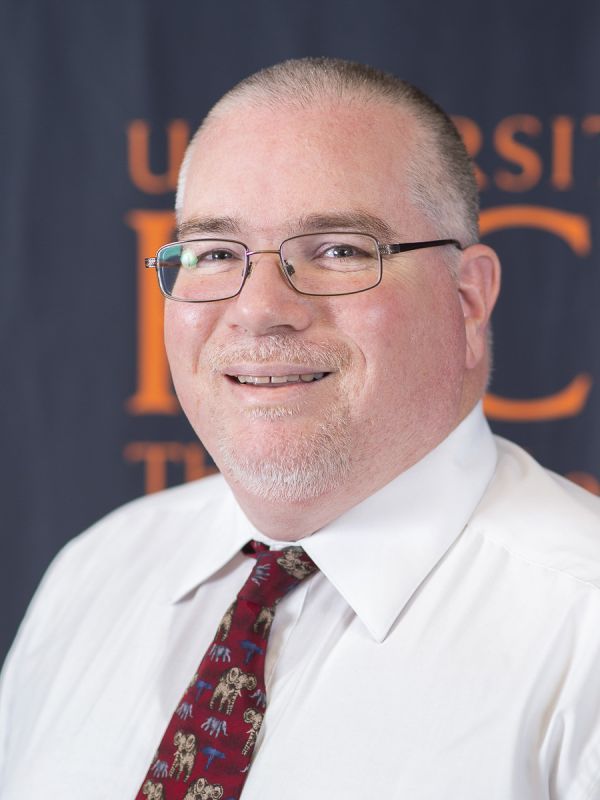
Wade Russu
At Pacific Since: 2005
Wade A. Russu, PhD earned a bachelor of science from California Polytechnic State University, San Luis Obispo in 1992 and his doctor of philosophy from University of California, Santa Barbara in 2000. He completed his graduate training at University of California, Irvine at both the Cancer Research Institute and at the Institute for Brain Aging and Dementia.
Dr. Russu's passion is for teaching chemistry in the context of pharmacy, which forces the students to think about chemistry from a new perspective. He hopes that when his students discover the practical application of chemistry it will cause them to have a greater interest in the subject. His goal is to provide valuable experience to students through practical research opportunities. The focus of his research is drug discovery for cancer and it is his aim to share those advances with the broader scientific community.
Dr. Russu enjoys problem solving and was drawn to his field of study by a curiosity about drugs and how they work. His career has been shaped by the mentorship of professors R. D. Little and James Nowick. Dr. Russu is a member of the Phi Lambda Upsilon National Honorary Chemical Society, the Rho Chi Pharmaceutical Honor Society, the Alpha Chi Sigma National Chemistry Fraternity, the American Association of Colleges of Pharmacy, the American Association for Cancer Research and the American Association for the Advancement of Science. He is also actively involved in the organic and medicinal chemistry divisions of the American Chemical Society.
He and his wife have seven children, two biological children and five adopted children. He also loves scuba diving and has been a home brewer for over 30 years.
BS in Biochemistry, Cal Poly, San Luis Obispo, 1992
PhD in Chemistry, University of California, Santa Barbara, 2000
PostDoc, University of California, Irvine, Cancer Research Institute, 2001-2002
PostDoc, University of California, Irvine, Institute for Brain Aging and Dementia, 2003-2004
Teaching Philosophy
"I see my role as a teacher providing the tools, knowledge and insight necessary to facilitate the active and responsible participation of the student in the learning process. I strive to help the student grasp and apply knowledge and concepts and to enlighten them as to their relevancy to the profession of pharmacy. ‘Learn by doing' is a unifying learning style that can benefit every student. It gives the student an opportunity to practice critical thinking, to use the skills that are being developed and assess progress. It also provides a sense of satisfaction that goals are being met and positive reinforcement for the student and instructor. In my courses I work toward a ‘learn by doing' methodology by providing in class problem solving, as well as discussion/lab sessions, self-assessment problem sets and quizzes. For some topics I provide outside reading material from texts, original research papers and my own topical narratives."
Courses
PCSP 211 — Drug Design
PCSP 208 — Pharmaceutical Analysis
PCSP 203 — Laboratory Management
PCSP 209 — Technical Writing
PCSP 397 — Graduate Research
PHRM 117 — Principles and Application of Dosage Forms
PHAR 341 — ICS: Cardiovascular Disease I Foundations
PHAR 343 — ICS: Endocrine Disorders
Research Summary
“Design and synthesis of anti-tumor cell quinazoline-based kinase inhibitors. We have designed quinazoline-based kinase inhibitors that show potent inhibition of tumor cell lines. The first are piperazinylpyrimidine derivatives, one chemotype of which are sub-microM binders of the ATP binding site of the platelet-derived growth factor receptor (PDGFR) family of kinases (PDGFRa, PDGFRb, KIT, Flt-3, CSF-1). These molecules showed a selective pattern of activity on the NCI-60 tumor cell panel. The significance of this is that one molecule was selective for oncogenic forms of KIT compared to wild-type KIT and was optimized and demonstrated in vivo activity. In a related project a different quinazoline chemotype showed significant inhibition of the Nf-κB signaling pathway and tumor cell proliferation while initiating apoptosis.
"Additionally, the design and synthesis of kinase inhibitors has allowed us to use them as biological probes to investigate potential therapeutic targets of significance to cancer. For example, we discovered that CDK8, a target in some colon cancers, may also be a target in some triple negative breast cancers. We have also used another molecule discovered in my lab as a chemical probe, in collaboration with Dr. Chan’s lab, that led to the discovery that the aryl hydrocarbon receptor (AhR) undergoes chaperone-mediated autophagy in triple negative breast cancer cells.”
Research Interests
- Drug discovery/design for cancer
- Peptides/peptidomimetics as drugs
Scholarly Activity
Xu, L.; Russu, W.A. “Molecular docking and synthesis of novel quinazoline analogues as inhibitors of transcription factors NF-kB activation and their anti-cancer activities.” Bioorg. Med. Chem. 2013, 21, 540-546.
Shallal, H. M.; Russu, W. A. “Understanding the Molecular Basis of Tyrosine Kinase Intrinsic Promiscuity Toward Binding Type-I and Type-II Kinase Inhibitors. KIT versus INSR as a Case Study.” IJRDO-J. Biol. Sci. 2017, 3(11), 1-25.
Wilson, E. A.; Shallal, H. M.; Russu, W. A. “Preliminary in vitro and in vivo investigation of a potent platelet derived growth factor receptor (PDGFR) family kinase inhibitor.” Bioorg. Med. Chem. Lett. 2018, 28, 1781-1784.
Spear, J. M.; Lu, Z.; Russu, W. A. “Pharmacological inhibition of CDK8 in triple negative breast cancer cell line MDA-MB-468 increases E2F1 protein, induces phosphorylation of STAT3 and apoptosis.” Molecules 2020, 25, 5728.


